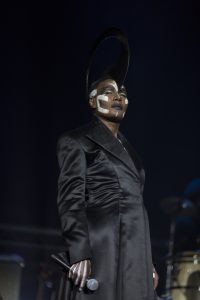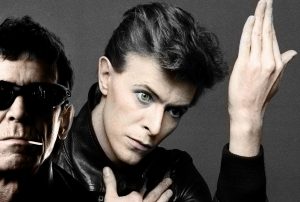In most cases, androgyny in the ’80s was used as a marketing tool according to Liz Faber in her article “Trans Sexual.” The androgynous look was considered to be a cool, fresh take on anti-fashion for the youth. Because of this view on the style, marketers often used the style in their campaigns to convince young people to buy their products.

Grace Jones- “Grace Jones,” digital image, taken 1 June 2015, posted to Flickr by user “Bruce”, https://www.flickr.com/photos/theholygrail/18229578078/.
Grace Jones, a Jamaican singer, songwriter, and supermodel of the ’80s with iconically sharp features, was often hired to feature in an ad campaigns while wearing a suit to sell cars and electric scooters to viewers of the campaign. Her fresh and modern look made both men and women feel like they could be just as fresh and modern as her in the car or on the scooter.

David Bowie- “lou-reed-david-bowie,” digital image, taken 18 January 2016, posted to Flickr by user “Jussi”, https://www.flickr.com/photos/nesster/24097477119.
Androgynous fashion was also used by music artists as a way to market themselves as unique against their competitors in order to sell more albums. Singers like Boy George and David Bowie were known for wearing flamboyant outfits and brightly sculpted make-up looks. Their looks specifically came out of the club scene in the UK as part of the New Romantic Movement, which encouraged music artists to adopt androgynous looks in 1980s club scenes and later in the mainstream music scenes. These looks, no doubt, helped music artists become icons which in turn boosted their music sales as they made news for their eccentric looks.
Whether for marketing or for personal preferences, androgynous fashion inspired the flexibility of gendered trends in the 1980s, encouraging women to “borrow from the boys” and men to “borrow from the girls.” These trends may not have trickled down to the UMW campus, but they certainly opened doors for exploration in fashion that would later inspire future designers and fashion icons to think out side the box of gender.